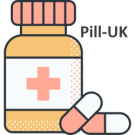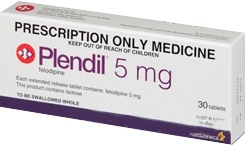In today’s world, emotional distress, smoking, overeating and excessive alcohol consumption can lead to an attack of angina, or what is also called a “chest cold”. Where does this analogy come from? Many people describe the sensation of an attack as a squeezing or constricting pain in the chest. Unfortunately, the number of patients suffering from angina pectoris is increasing every year, as is the total number of people with cardiovascular problems and diseases. Among the drugs that help stabilise angina pectoris is Plendil, an effective slow calcium channel blocker that has helped a large number of people in United Kingdom with angina attacks.
If you already know the properties of this medicine and the necessary dosage, we recommend that you buy it from our online pharmacy at the best price and with fast delivery. Another advantage: only here you can order this medicine without a prescription.
What Plendil Is And How It Affects The Body
Plendil is an effective drug that has several aces up its sleeve. In addition to lowering blood pressure, it reduces cardiac afterload, improves the balance between myocardial oxygen intake and consumption, and inhibits calcium channels.
Indications
The drug is used for the treatment of angina pectoris and hypertension.
Contraindications for use
Hypersensitivity to the active substance felodipine or to any other component of the drug, decompensated heart failure, acute myocardial infarction, unstable angina pectoris, pregnancy, lactation, age below 18 years are contraindications to the use of Plendil. People with impaired renal function should use the drug with extreme caution and only under the supervision of a doctor.
Before starting treatment, you should consult your doctor to find out if you can use this medicine. Do not forget to mention any illness or medication you are taking.
Side effects
The drug is generally well tolerated by patients. Side effects such as headaches, hot flushes and peripheral oedema are quite common and usually disappear on their own. Occasionally, tachycardia, fatigue, dizziness, paraesthesia, nausea, rash, pruritus, fainting, vomiting, arthralgia, myalgia, urticaria have been reported. In isolated cases, individuals taking the drug have complained of sexual disorders, impotence, allergic reactions (fever, angioedema) and gingival hyperplasia. In case of serious adverse reactions, consult a doctor immediately.
Dosage and administration
Consult your doctor before starting treatment. The doctor will confirm the diagnosis and determine the appropriate dose for the patient, which may be different from the usual recommended dose.
The tablets are administered orally and should be taken in the morning on an empty stomach with plenty of water.
Hypertension: the initial dose is 5 mg once daily. If necessary, the dose can be increased or another antihypertensive can be added. The usual maintenance dose is 5-10 mg once daily. In elderly patients, consideration should be given to starting treatment with a daily dose of 2.5 mg.
Angina pectoris: The initial dose is 5 mg once daily, increasing to 10 mg once daily if necessary.


